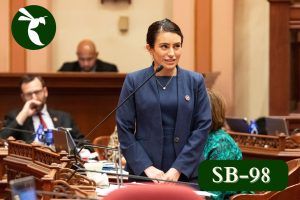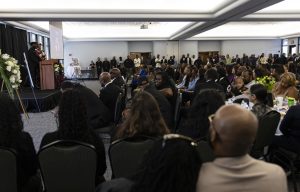Voting campaign launched
November 29, 2007
Only 47 percent of America’s citizens age 18 to 25 voted in the 2004 presidential election between current republican President George W. Bush and democratic candidate John Kerry.
Declare Yourself, a nonpartisan, nonprofit youth voter campaign, wants to raise that percentage, according to its website.
The California-based campaign was founded by Norman Lear in 2003 after a “Declaration of Independence Road Trip.”
In 2000, Lear and his wife, Lyn, purchased a copy of the Declaration of Independence and decided to set off on a road trip around the
United States with it and a multimedia exhibit, hoping to motivate young people to vote.
“As the largest generation since the Baby Boomers, 18 to 25-year-olds have the potential to move political issues and change policy if they act,” said Marc Morgenstern, executive director of Declare
Yourself, in a press release. “The first step is registering to vote.”
Through the use of its website, the Declare Yourself campaign registered more than 1 million young adults in 2004.
The 2004 Declare Yourself campaign was aided by a number of organizations and companies including Rolling Stone, Clear Channel, Borders, American Eagle Outfitters and Comedy Central.
“We use the power of youth culture, especially young celebrities and viral videos, to draw attention to the voting gap,” Morgenstern said. “We then provide the latest Internet and mobile technology to make it as simple as possible for young adults to register.”
He said computers are playing a bigger role in informing people about presidential candidates.
Desiree Long, senior criminal justice major, said she has noticed more political advertisements on the Internet.
“The Internet is a more effective way to educate young voters,” Long said. “I see lots of students around campus on their laptops.”
Some political parties are even using the popular website YouTube to help aid their political campaigns.
MTV specials on presidential elections, political commercials and televised debates also help inform younger voters about politics.
For 2008, Declare Yourself has set a goal of registering at least 300,000 voters for the primaries and at least 2 million before election day.
“Nearly one year before the 2008 presidential election, and only weeks before the accelerated primary schedule, we are challenging young adults to step up and play a leading role in this…election,” Lear said in a press release.
Some Sac State students believe the number of young voters is low because of the amount of immigrant parents not advocating voting to their children.
“Why should they inflict something on their children when they know nothing about it,” said Sergio Martinez, senior government major.
Government professor Jeff Lustig said he suspects young voters aren’t appearing at voting stations because they have had bad experiences with the governmental system.
“I suspect they’re not showing up to vote because they sense that the system has been so badly corrupted and the electoral system so closed to the real issues of their lives that it doesn’t make any difference,”
Lustig said in an e-mail interview.
As part of the annual Declaration of Independence Road Trip, members of the Declare Yourself campaign have traveled to nearly 51 cities and towns in 31 states. Campaign members also attended the 2002 Super Bowl in New Orleans and have been to six presidential libraries throughout the United States.
Over 115,00 students from 18 different college campuses have visited the multimedia exhibit, according to the website.
Erika Alatorre, director of the Office of Governmental Affairs, said efforts to get students registered to vote have stepped up at Sac State as well.
The Office of Governmental Affairs has increased its efforts to register student voters for the past three years, Alatorre said.
Alatorre estimates the Office of Governmental Affairs registered over 1,000 student voters last year.
According to the census.gov website, 77 percent of voters who participated in the 2004 presidential election said they had at least some college education.
Christina Call, sophomore nutrition major, said she votes.
“I think voting is really important…the results are going to affect us most…in the long run,” Call said.
Michael Wadle, an academic internship adviser in the government department, said he believes people who don’t participate in the voting process would vote for the majority anyway.
“There is research that indicates that voters who don’t vote would likely mirror voting patterns of those who do. If so, you would have the same results for who is elected and what propositions are passed,” Wadle said.
Juan Jose Barrios, a senior criminal justice major, believed otherwise.
“Voting is very important, but you need to have your own views and not follow other people’s,” Barrios said. “My parents are democrats and this year I think I’m going to vote republican.”
Jose Martinez can be reached at [email protected].























































































































